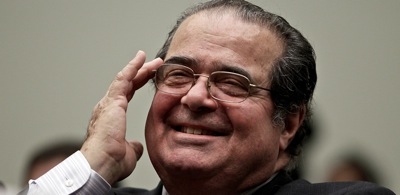Associate Supreme Court Justice Scalia
When the divided high Court debated affirmative action, the addition of race as even one factor in college admission appeared to be too much for conservative jurist Antonin Scalia in the case of Fisher v. Texas heard again last Wednesday. Justice Scalia questioned whether affirmative action was actually harming Black students.
Abigail Fisher, a White high school student, applied to the University of Texas in 2008. At the time, the University of Texas had an admission policy that automatically admitted the top 10% of all Texas high school students. Fisher was not in the top 10% of her high school class.
A second tier of the Texas policy admitted students based on factors such as leadership, student achievement, family income, experiences, language spoken at home, and race. Fisher failed the holistic review as well. She sued the university alleging race discrimination was the reason why she was not admitted.
She lost her case and appealed to the Supreme Court. That first case Fisher v. Texas (I) was heard in 2013. It was the same year the Voting Rights Act was gutted of its protection of preclearance in Shelby v. Holder. Many in civil rights thought it was the end of affirmative action in higher education, altogether.
However, the Court ruled in Fisher I that the university must review its plan and try to find an affirmative action policy that did not involve race. Now, Fisher v. Texas (II) is the return of the University of Texas to the Court to explain why it is still necessary for its admissions policy to contain race as even one factor among many.
Affirmative action began in 1961 when President John F. Kennedy noted that affirmative measures or actions were needed to fight the persistence of racial discrimination. President Lyndon Johnson signed the 1964 Civil Rights Act, the Voting Rights Act of 1965 and Executive Order 11246 which called for affirmative action in employment, the government and higher education.
But, in 1978, the University of California was sued by Allan P. Bakke, a White, 35 year-old medical school applicant, who alleged the school’s affirmative action policy violated his Equal Protection rights under the Fourteenth Amendment. The the U.S. Supreme Court declared affirmative action constitutional but invalidated the use of racial quotas.
College admission committees, concerned over “reverse discrimination” lawsuits, began dismantling their affirmative action plans. In 1995, the University of Michigan was sued by Jennifer Gratz and the university’s law school was sued by Barbara Grutter. The Supreme Court ruled in Grutter v. Bollinger that the use of race must be used narrowly and then limited the need for it to 25 years.
Last week, Chief Justice John Roberts turned to attorney Gregory G. Garre, for the university, and asked, “Is this going to be done in twelve years?” Garre responded “that in 2004 the university had 272 African-Americans out of a class of 8,000.” It was at this point that Justice Scalia questioned whether affirmative action was actually harming Black students.
Scalia said, “It does not benefit African-Americans to get them into the University of Texas where they do not do well.” He suggested that they attend “less advanced schools” or “slower track” schools because most of the Black scientists don’t come from schools like the University of Texas. Blacks would be better off, he said, testily.
Maybe the university ought to have fewer Blacks students, Scalia added. The conservatives on the Court made their impatience with affirmative action clear. Even as Garre explained, “there are systematic problems this policy is attempting to address.” Chief Justice Roberts said pointedly, this was meant to be a necessary but temporary policy.
The case will be decided by June.
__________
Gloria J. Browne-Marshall is an associate professor of constitutional law at John Jay College (CUNY). She is the author of Race, Law, and American Society: 1607 to present (Routledge) and the Supreme Court correspondent for AANIC (African-American News & Information Consortium). Twitter: @GBrowneMarshall







